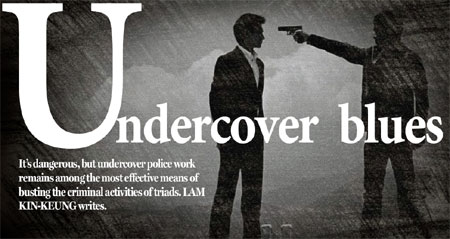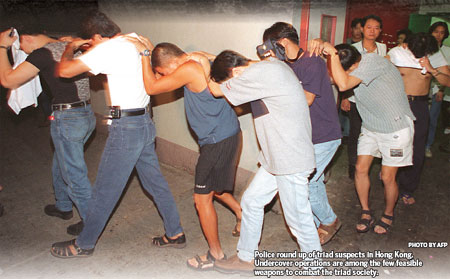Undercover blues
Updated: 2012-02-10 08:05
By Lam Kin-Keung(HK Edition)
|
|||||||


It wasn’t one of my ordinary assignments to dress up like a “get-rich-or-die-trying” gangster. Clad in a well-cut radiant suit, with garish gold and diamond rings perched on my fingers, a shimmering gold necklace that betrayed a cheesy style, I was perfectly camouflaged as someone with enough street smarts to profit from dirty deals.
I had to be a sophisticated bait to lure him into a deal. And the fish I first met, I already knew well from my connections. But in the subtext of our banter, we were prying into each other. The last thing I wanted him to know was that I was police. We were secretly taking photos.
I had already chosen a bar where I otherwise wouldn’t go, to avoid bumping into acquaintances. It was easy enough to speak in the coarse language and triad argot, but never was it easy to scrap my usual police parlance, or to set aside telltale signs of the characteristic police culture in which I had been long immersed.
I thought about every sentence I said within seconds. I had to memorize all the bits and pieces I trumped up, to avoid any glaring inconsistency. I tried to keep my words short, and then passed the ball back to him.
The guy thought I spent my time gambling in local casinos and hanging around karaokes with prostitutes in Dongguan and Shenzhen, the right qualities for someone to become his conspirator.
But he was on high alert. There was not a minute that he did not look around
and scan the place, checking to see if the cops had shown up.
“Loose lips sink ships,” he sneered.
Unfortunately, he stuck to his mantra. The guy was so cautious that even after three more meetings, he sensed it was not safe to do business with me. I did not see him thereafter.
It was not my proudest task, and yet the only opportunity I had to be an undercover cop myself — though for a short period of time, it was a rare challenge.
In dealing with the triad society, undercover operations are among the toughest jobs. Still these operations were a most effective way to disrupt and cripple the tongs, as long as the operations were planned out and progressed cautiously.
Undercover operations are among the few feasible weapons to combat the triad, in that triad related crimes are usually much more structured and destructive, and more underground too. When crimes are committed, chances are high that victims and witnesses are afraid to talk, not to mention giving courtroom testimony.
In Hong Kong, although it constitutes a crime simply when one announces his membership in the triad, or for that matter takes part in any triad gatherings, triad rituals, recruiting gang members or possessing any triad-related documents or account books *etc*, these crimes do not have conspicuous victims. It’s unlikely anyone would dare report information about these criminal activities to the police.
In a case that took place in recent years, an undercover police officer provided evidence of a group of triad members holding a ritual to pay homage to a gang leader who had been killed by his foes. The gathering otherwise would appear simply a traditional ritual done on the Hungry Ghost Festival. It would have been hard to convict the participants on triad-related charges were it not for conclusive evidence collected from the inside.
An undercover officer’s first need is to secure trust from gang members, in the hope he will be recruited by the triad. It is not like in the movies that the officer can commit any crimes whenever he is asked to, although he will obtain immunity from Department of Justice with previous permission. He needs to use his wits to be adaptable and get around, reminding himself that his goal is to gather as much criminal evidence as possible. At times, an undercover officer becomes an internal source helping to crush an up and coming crime activity.
A successful penetration into the internal workings of criminal organizations may deal a substantial blow to the tongs or factions. After a long operation and when it’s time to draw in the net and see what’s come up, a raft of solid crime evidence may be accumulated and applied to convict a troop of gang members. Conviction of several members could put a damper on the triad, or at least force it to become less active.
A recent large-scale, undercover operation code named Night stinger, resulted in the arrests of 222 triad members, including some big guys and a Sun Yee On high-ranking gang leader. The operation took two years.
For the past few decades, the Hong Kong police have strategized a number of undercover operations to slip undercover moles into triad society. Though rather costly, undercover operations are constantly applied when it is considered necessary and the best effective way to collect intelligence and crush the gangs.
For the undercover cop, successful operations provide a sense of achievement, not to mention an exciting opportunity for a sight-seeing tour into the inner depths of the triad society.
But that would be a lonely tour for the moles. He is forbidden to tell his family or friends, not even his fellow police, about his involvement in the operation. So when the undercover cop hangs out with the gangs, the last thing he wants is to bump into members of the gang he once busted, or his former colleague who comes out of nowhere and says hi, asking “which unit are you at?” or “got a promotion yet?”
The mole can never predict what’s going to happen in the next minute, or what might occur to blow his cover, so as to endanger his very life. That’s even more of a factor today, when the triad are much more vigilant when recruiting members.
Today triads are more likely to recruit familiar faces, people they grew up with, started stealing with and beating up other people. They have become highly suspicious of anyone who suddenly parachutes in.
During one court trial, an undercover operative gave his account of how he spent his days during the operation. He never was offered full recruitment, but was hired at a speakeasy operated by some core members of the SunYee On, working for a faction leader.
Once the gang leader said abruptly, “I heard there is an undercover here.”
The gang leader looked at the officer and continued, “I have thought that you’ve looked suspicious for a long time, are you the undercover cop?” The mole obviously tried to be composed and said, “You could just fire me if you don’t trust me.”
The gang leader gave a fierce look and clamored, “Do you think Sun Yee On is trash? If you are really a mole, we will chop you to death!”
Luckily, what was said did not go further. The next day the gang leader told the undercover cop to forget about what was said because the gang leader was drunk. The cop finished his work eventually unscathed.
Sometimes the situation can get seriously thorny. During my years with the Organized Crime and Triad Bureau, we contrived and guided an undercover operation which lasted for two years. The mole managed to be recruited by several triad tongs. But towards the end of the operation, he was
suspected by his faction leader, and was immediately expelled, given no chance to argue on his own behalf.
We were shocked and had no idea what the mole had done wrong.
We figured that there was no turning point down the line. Nor could we predict what would have happened the next, or whether my buddy would be chased and chopped in any minute.
That operation had to be called off. The unit later decided that the officer should carry along firearm for his safety.
But the effort was not futile. Our buddy collected 121 pieces of serious crime evidence, with 60 triad members arrested, and some sent to jail. Among those convicted was the former dragon head who was in charge of the entire triad tong Wong Shing Wo and a powerful guy behind the scene. That was a huge blow to the tong.
There shouldn’t be a reason to feel sorry for the gang members, even though the moles live in their world for quite some time. Another undercover operation we designed, seized the biggest haul of marijuana ever to that time. We arrested our target on his birthday. The undercover cop joked to me that he felt sorry for the guy. But we both knew he didn’t.
Andrea Deng contributed to the story.
About the author
Lam Kin-keung is a retired detective station sergeant who served the Hong Kong Police Force for 34 years. He worked at the Organized Crime and Triad Bureau from 1997 to 2005 after serving with regional intelligence and regional crime among other units. Lam is recognized for his skill in intuiting the minds of criminal suspects and his leadership in different kinds of criminal cases. He was awarded the Hong Kong Police Medal for Meritorious Service in 2009.
The reality vs the movie version
Hong Kong people love the myths about undercover cops glamorized in the cinema. The film Infernal Affairs released in 2002, arguably the most successful one of the genre. Infernal Affair made its mark at the box office with the dramatic upheavals of its story line.
In a most imaginative turn, a mole from the triad infiltrates the police force. The mole has managed to immerse himself in the police force for nearly a decade, attached to highly sensitive and crucial units, dealing with clandestine intelligence. So successful is he at his cover, he even gets promoted to inspector.
I have never heard of a case of this kind. I have to say the odds of its happening are very low. In general, a candidate faces stringent and thorough investigation into his background and character before he gets into the police college for training. A police officer preparing for promotion faces a second round of inquiry to make sure he is clean.
Indeed some former triad members got around the censorship and enrolled in the police force, but we never found them connected to the triad again.
After the Independent Commission Against Corruption was founded, a few cases were discovered in which police had connected with triads and engaged in graft or crime, but they were bribed with money and other temptations and were not working as undercover operatives. Even if a triad member does manage to get into the police force and attempts to collect intelligence, our intelligence would track down on him sooner or later.
The rigorous policy we have would not make it easy for him to go undetected.
(HK Edition 02/10/2012 page4)